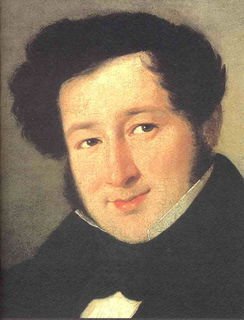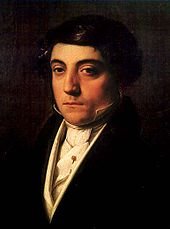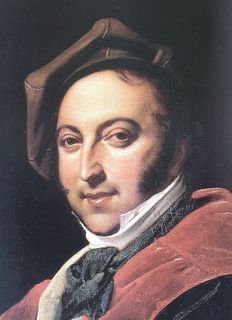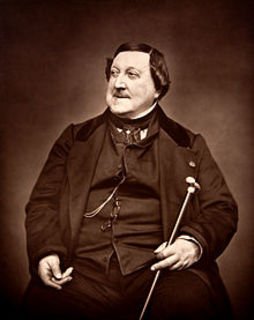10 Of Rossini's Compositions in Honor of His Birthday
Today is Gioachino Rossini's birthday, as many of you may or may not know. Rossini is best known for the Operatic music he composed. Here's a little bit about Rossini:

The Life of Rossini
Gioachino Rossini was born on February 29th, 1792 (Rounded down to the 28th to avoid conflict with Chopin's birthday tomorrow). Rossini was the son of Giuseppe Rossini, a trumpet player who was associated with many random bands and orchestras. His mother was Anna Guidarini, who was a singer of secondary roles (not leads). Rossini's parents began to teach at a very young age. At the age of 6, he was already playing the triangle in one of his father's bands. Because of his heritage, Rossini found himself at the theatre throughout most of his childhood. Even though he was not very inclined as a student, he found it easy to learn to sing and play.

At the age of 14, Rossini enlisted as a student at Conservatorio di Bologna (Bologna's Philharmonic School). It was here that he would compose his first opera seria-Demetrio e Polibio (1806; first staged in 1812). By the age of 15, Rossini had already learned how to play the violin, harpsichord, and horn. He would often sing in public, as well as the theatre, to earn some extra money.
Rossini began by writing the genre popular at the time, opera buffa (comic opera). The first opera he would compose in this genre was La Cambiale di Matrimonio (composed 1810). The title means "The Bill of Marriage," and the opera was performed in Venice, and brought certain success, even though the singers were aggrieved by the unusual orchestration that made up the opera. He would ultimately have 2 more of his comic operas produced in Venice in the following year.

Rossini had already subdued the traditional form of opera buffa by creating the new florid style of singing, bel canto. He used unusual rhythms, made his ensembles and finales lively, and restored the orchestra to its "rightful" place. He made the music the feature of his shows, rather than the singer. In 1812, Rossini would write his next comic opera entitled The Oratrio Ciro in Babilonia meaning (Cyrus in Babylon) that year, he also wrote La Scala di Seta, meaning "The Silken Ladder."
Rossini wrote many famous works including "The Barber of Seville," and "Guillaume Tell (1829)." He was also a gourmet chef who developed a dish you may have heard of "Shrimp Rossini." He would also be commissioned to write a magnitude of operas, and be given a handsome pension for his work after 30 operas.

Sadly, Rossini died on November 13, 1868 from pneumonia. He was buried in Pére Lachaise Cemetery in Paris, France until in 1897, his remains were transfered to the Basilica of Santa Croce, in Florence Italy. This was done at the request of the Italian government.
Rossini left behind a magnitude of works, here are 10 that I have decided to include: (Thank you to my Music Theory teacher for helping me to select these).
[Image is an actual photograph of Rossini taken in 1865]
10 Compositions (Including Operas and other works)
10. La Danza
This piece is definitely exhilarating. I've decided to list his operas last, and start out with a song (as in short vocal work). The performer for the video I have chosen is Luciano Pavarotti, perhaps one of the most famous tenors ever to live. This song is about dancing in celebration during the night time (energetically), and dancing all night. Think of this like the original "Best Song Ever." ("Danced all night to the best song ever.")
9. Any of His Piano works
This particular volume that I am sharing is volume 4. Rossini's piano works sound beautiful! When I was researching him, I learned that he was a lazy student. To that I say, What if he had been disciplined? He sounds like a pro while being a "lazy" student. What I've listened to from this volume is absolutely gorgeous, and it definitely demonstrates that Rossini understood the piano (Piano music) just as well as he understood the voice (Opera).
8. Sins of Old Age
This music sounds a bit darker than the music I've listened to so far on this list. It is not full on demonic, but it displays regret, which is understandable (given the title). I've decided to include Un Cauchemar from Rossini's "Sins of Old Age," but this is not the only music from the series.
7. Stabat Mater - Finale (Amen)
This work is absolutely beautiful! Reading about the piece, it does not appear to be an opera, but rather a work for vocal soloists. It appears 6 of its movements were composed by Rossini's friend Giovanni Tadolini, but at its completion, Rossini took full credit. This sounds a bit like a requiem to me. It is grand, with a touch of sadness.
6. La Cenerentola (Overture)
This overture is catchy! For those of you who don't know, an overture is like flickering the lights. It is used as a sign that the show will be starting soon, it is like a trailer in that it shows what you can expect. Therefore, many of the pieces on this list will be overtures. This overture's theme makes me think of walking in a fixed rhythm, it is steady, absolute, and set on its destination.
5. The Thieving Magpie (La Gazza Ladra) (Overture)
This sounds like royalty music, which would make sense because overtures were usually a sign that the king was entering the theatre. I think of a flag waving in the wind when I hear this piece, I suppose it's because a flag is grand and depicts pride, and I feel this piece conveys those two nicely.
4. Demetrio e Polibio (Overture)
I decided to include the first Overture Rossini ever composed, from his first Opera. You can hear the difference between this and some of his later pieces (which is why I included two pieces from after he had experience). This is definitely more simplistic than the others, but I still feel it demonstrates how skillful Rossini was at composing, even in his youth (especially operas).
3. Semi Ramide (Overture)
This piece does sound a little darker than the other pieces previous in the beginning, however as it progresses it becomes more and more grand. I feel it could depict learning something new. At first you don't know much and feel miserable, but as you learn you grow more excited, and passionate about what you're learning.
2. The Barber of Seville (Overture)
You'll likely recognize this piece from the Looney Tunes cartoon skit involving Elmer Fudd and Bugs Bunny entitled The Rabbit of Seville using the music as a soundtrack. This piece, begins with a theme that I didn't really hear in the looney tunes, and transitions into the scurrying theme that we are all so familiar with. I am definitely gonna have to add this to my playlist. This is likely Rossini's second most famous piece, which is a classic as well as a masterpiece.
1. William Tell (Overture)
If you haven't heard this piece, I'm sorry but you're living in a bubble. This is famous because of Lone Ranger, and like every race on modern shows. It is from the opera William Tell which is based on a Swiss legend. I'm gonna quit commentating and just put in the piece. It truly was one of Rossini's best, and probably one of the best Overtures EVER, and most well known. (Famous part starts at 8:45)
Sources
Information
Images
Thanks for reading this! Rossini is likely one of the most contributing composers to operatic music,so I can definitely say that today (actually February 29th) is an important day in history. As always, feedback is appreciated. Please let me know what you thought of my selections, as well as my descriptions. And remember to check back later!
Also remember to check for: My weekly 7 post, [Something else will eventually go into this space]!

beautiful post!
Thanks!